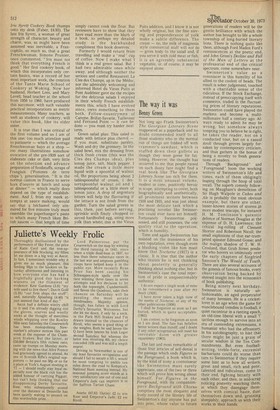The way it was
Benny Green
Not long ago Frank Swinnerton's The Georgian Literary Scene reappeared as a paperback and no doubt commended itself to all those students who in the normal run of things are fobbed off with crammer's sawdust, which is stuffed down their gullets as though they were geese for fat tening. However, the thought has occurred to me that people raised on such dusty fare might find a
real book like The Georgian Literary Scene too rich for them.
It is a most unusual volume, modest in tone, positively heroic in scope, attempting to cover, both biographically and aesthetically, all prominent writers between 1910 and 1935, and was just about the most delicate task which a practising novelist like Swinnerton could ever have set himself.
Fortunately Swinnerton possessed, and still possesses, the one quality vital to the operation, which is humility.
Time and again Swinnerton has insisted on the transience of his own reputation, even though even
a blushing violet like him must know that Nocturne (1917) is a classic. It is true that the author
who insists he is not thinking about posterity is generally thinking about nothing else, but in Swinnerton's case the total rejection of pride is unquestionably authentic:
1 do not expect a single work of mine to be remembered a year after my death (1928).
1 have never taken a high view of the merits of Nocturne, or any of my other publications (1956)
I shall be forgotten as soon as I am buried, which is quite acceptable. (1963) I am content to be forgotten as soon as I am dead. The fate has befallen
better writers than myself; and I doubt if any other octogenarian will meet his inevitable doom with greater equanimity (1963).
The last and most remarkable of those four articles of self-denial is the passage which ends Figures in the Foreground, a book which is, by the kind of irony a connoisseur like Swinnerton must surely appreciate, one of the two or three which will prove him wrong about himself. For Figures in the Foreground, with its companionpiece Background with Chorus comprises the most eloquent and lively record of the literary life of Swinnerton's day anyone has put , into print, whose value to future generations of readers will be the gentle brilliance with which the author has brought to life a whole township of long-buried literary lions. There is nothing quite like them, although Ford Madox Ford's reminiscences at the poetic end, and John Gross's Decline and Fall of the Man of Letters at the professorial end of the critical spectrum, come somewhere near.
Swinnerton's value as a reminiscer is this humility of his allied to the coolest of heads. The result is sober judgement, touched with a charitable sense of the ridiculous. If the Stock Exchange, instead of preoccupying itself with commerce, traded in the fluctuating prices of literary reputations, Swinnerton could have played the markets and become a multimillionaire half a century ago. Always ready to admit he may be wrong, but somehow always tempting you to believe he is right, he takes the reader, not on a conducted tour, but on a casual stroll through groves largely forsaken by contemporary criticism, and thus gathers in the bonus of being a novelty to fresh generations of readers.
Through 'Background' and ' Foreground ' loom the working writers of Swinnerton's life and times, each of them obligingly leaping through the hoop of total recall. The superb comedy following on Maugham's demolition of Sir Hugh Walpole in Cakes and Ale is probably the most obvious example, but there are other, lesser-known stories of storms In more modest teacups, for instance H. M. Tomlinson's quixotic defence of Norman Douglas at the expense of D. H. Lawrence; the critical log-rolling of Clement Shorter and Robertson Nicoll; the small explosions of that ear-trumpeted spinster Edmund Gosse; and the malign shadow of T. W. H. Crosland, that Grub Street predator who hovers so ominously over the early chapters of Siegfried Sassoon's The Weald of Youth. There are also several accounts of the genesis of famous books, every observation being backed by shrewd insight into the economics of book publishing.
Being ninety next birthday, Swinnerton is naturally unfashionable, an aged perpetrator of many heresies. He is a cricketlover in an age when the game for musclebound trendies is football, a quiet raconteur in a ranting epoch, an old-time liberal with a small '1' tactless enough to survive into an era of contending extremisms, a humanist who had the effrontery, in his autobiography, to hint that there might be just a grain of secular wisdom in the Ten Commandments. But even footballwriting, treble-forte, extremist barbarians could do worse than turn to Swinnerton if they require some hint as to how all writers, great and small, rich and poor, talented and ridiculous, come to their end, fighting bitterly with each other, and then, in mid-scrap noticing posterity watching them, at which they disengage themselves with comical haste, dust themselves down and, grinning sheepishly, approach us with their works in their hands.


































































 Previous page
Previous page